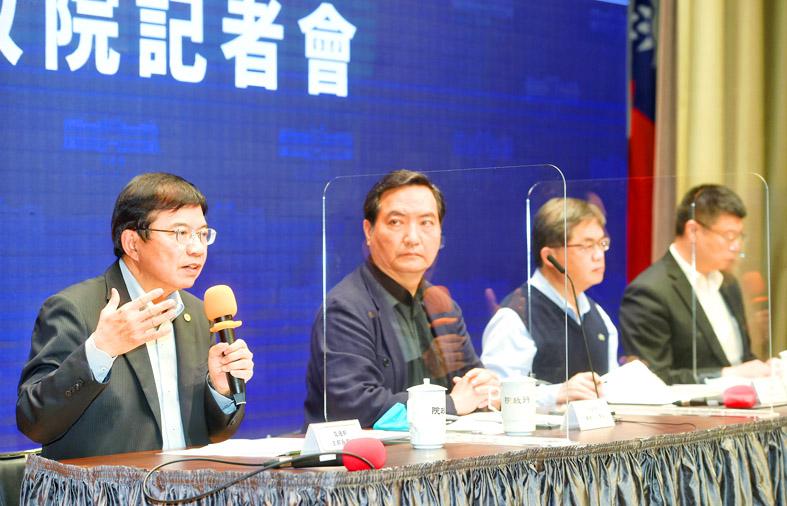The Executive Yuan yesterday announced measures to improve the safety and stability of the Taiwan Railways Administration’s (TRA) service and change its business model.
The government has pledged to reform the nation’s oldest and largest railway agency since the Taroko Express No. 408 derailment on April 2, which killed 49 people and injured 244.
In a Cabinet meeting earlier yesterday — which was attended by officials from the Ministry of Transportation and Communications; the Ministry of Finance; the National Development Council; the Public Construction Commission; the Directorate-General of Personnel Administration; and Directorate-General of Budget, Accounting and Statistics — Premier Su Tseng-chang (蘇貞昌) was briefed on key measures to be implemented.

Photo: Fang Pin-chao, Taipei Times
Su has prioritized safety, stability and transformation as the government seeks to reform the railway agency, the Executive Yuan said in a statement following the three-hour meeting.
To enhance TRA safety, Su has suspended 204 temporary track projects across the nation as the Railway Bureau conducts a comprehensive inspection, it said.
Construction would only resume after the bureau finds that all sites are safe and that the necessary regulations are in place to keep them safe, it said, adding that the bureau would manage the TRA’s railway construction projects.
The TRA is to set up operational centers in northern, central, eastern and southern Taiwan to oversee the integration of its electrical engineering, rolling stock, construction and transportation departments, the Executive Yuan said.
All slope containment projects along the TRA’s tracks would be thoroughly inspected to ensure that the safety measures in place could prevent foreign objects from blocking the tracks, it said, adding that the TRA could freely access any state-owned property to make slopes safe.
Artificial intelligence would be used to monitor workers’ access to construction sites and ensure their safety, it said, adding that construction site supervisors would be given handheld radios to quickly contact the railway agency in an emergency.
“The TRA should be responsible for the safety of construction sites and not leave the responsibility to the contractors,” it said. “There should also be a mechanism to ensure that contractors strictly follow safety regulations.”
Su was quoted as saying that the TRA has accumulated massive debt over the years, as it has been tasked by the government to serve remote areas, which are less profitable routes.
“The government will become responsible for the agency’s debt. Construction costs on projects that don’t pay for themselves and the agency’s annual pension fund payment, as well as certain interest payments, are also to be paid by the government,” the statement said.
Government officials and outside experts would work together on the possibility of turning the TRA into a state-run corporation, the statement added.

POSITIVE DEVELOPMENT: Japan and the US are expected to hold in-depth discussions on Taiwan-related issues during the meeting next month, Japanese sources said The holding of a Japan-US leaders’ meeting ahead of US President Donald Trump’s visit to China is positive news for Taiwan, former Japan-Taiwan Exchange Association representative Hiroyasu Izumi said yesterday. After the Liberal Democratic Party’s landslide victory in Japan’s House of Representatives election, Japanese Prime Minister Sanae Takaichi is scheduled to visit the US next month, where she is to meet with Trump ahead of the US president’s planned visit to China from March 31 to April 2 for a meeting with Chinese President Xi Jinping (習近平). Japan and the US are expected to hold in-depth discussions on Taiwan-related issues during the

‘LIKE-MINDED PARTNER’: Tako van Popta said it would be inappropriate to delay signing the deal with Taiwan because of China, adding he would promote the issue Canadian senators have stressed Taiwan’s importance for international trade and expressed enthusiasm for ensuring the Taiwan-Canada trade cooperation framework agreement is implemented this year. Representative to Canada Harry Tseng (曾厚仁) in an interview with the Central News Agency (CNA) said he was increasingly uneasy about Ottawa’s delays in signing the agreement, especially as Ottawa has warmed toward Beijing. There are “no negotiations left. Not only [is it] initialed, we have three versions of the text ready: English, French and Mandarin,” Tseng said. “That tells you how close we are to the final signature.” Tseng said that he hoped Canadian Prime Minister Mark Carney

President William Lai (賴清德) yesterday bestowed one of Taiwan’s highest honors on Saint Vincent and the Grenadines (SVG) Ambassador Andrea Clare Bowman in recognition of her contributions to bilateral ties. “By conferring the Order of Brilliant Star with Grand Cordon on Ambassador Bowman today, I want to sincerely thank her, on behalf of the Taiwanese people, for her outstanding contribution to deepening diplomatic ties between Taiwan and SVG,” Lai said at a ceremony held at the Presidential Office in Taipei. He noted that Bowman became SVG’s first ambassador to Taiwan in 2019 and

A man walks past elementary school artworks at the Taipei Lantern Festival in Ximen District yesterday, the first day of the event. The festival is to run from 5pm to 10pm through March 15.